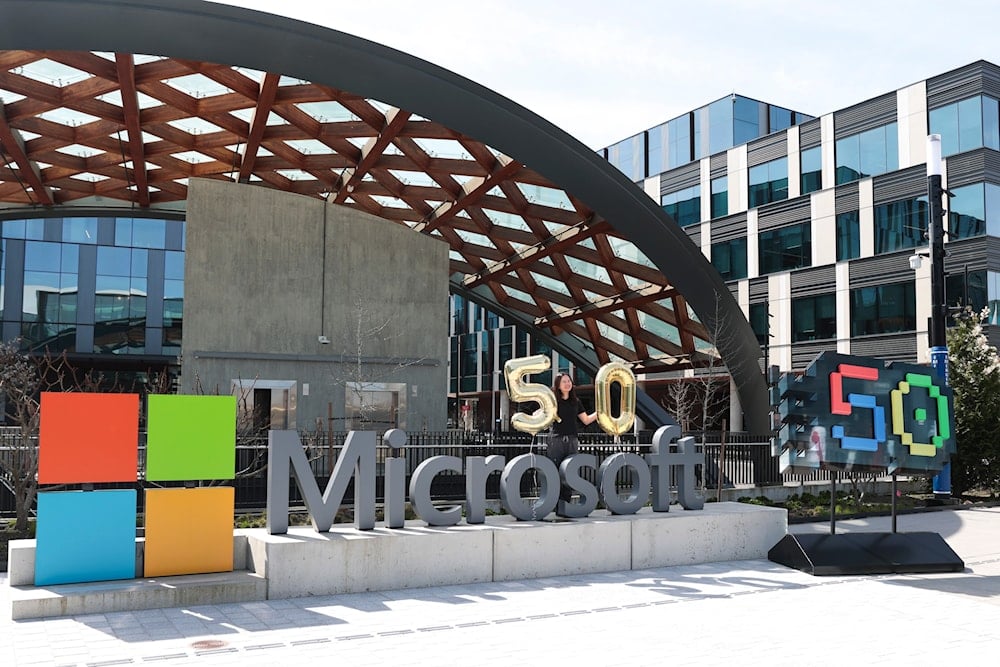Microsoft prohibits 'Palestine' in internal messages
Microsoft is facing backlash over internal email filters blocking terms like “Palestine” and “Gaza,” as employees protest the company's contracts with the Israeli military during the Gaza offensive.
-

A Microsoft sign is decorated in celebration of the company's 50th anniversary at Microsoft headquarters, Friday, April 4, 2025, in Redmond, Wash. (AP)
Microsoft has reportedly introduced a policy that automatically blocks employee emails containing terms like "Palestine," "Gaza," or "genocide" on its internal exchange servers, as revealed by No Azure for Apartheid, a pro-Palestine employee advocacy group at the company.
The automated filter, which stops these emails without notification, was first noticed on Wednesday shortly after Microsoft’s Build developer conference experienced repeated disruptions caused by the activist group.
The group noted that terms like “Israel” and “P4lestine” are not blocked by the filter, while Microsoft has not yet responded to DropSite’s request for comment.
Microsoft has faced growing internal backlash over its partnerships with the Israeli military and government during the continuing offensive in Gaza, with employee protests disrupting company events as workers object to Microsoft's provision of cloud computing services and other key infrastructure supporting Israeli military operations.
Reports by Dropstie, +972, and The Guardian showed Microsoft aggressively sought contracts with "Israel's" Defense Ministry by developing customized proposals and offering substantial discounts on cloud and AI solutions, with these agreements being carefully negotiated over several months to establish Microsoft as a critical technology supplier during Israel's military campaign in Gaza.
Microsoft acknowledged the validity of the documents and reporting without dispute but issued a statement shortly before its flagship annual events, claiming an internal investigation revealed no proof that its Azure, AI technologies, or other software products had been utilized in operations causing harm to individuals.
Internal documents and emails obtained by Drop Site reveal that Microsoft began aggressively pursuing contracts with the Israeli military within days of the October 7, 2023, attacks and the subsequent Gaza offensive, strategically positioning itself to capitalize on anticipated defense budget increases.
These efforts ultimately elevated the Israeli military to rank among Microsoft's top 500 global clients within months of intensified negotiations.
Microsoft fires employees for protesting support for 'Israel'
A workers' advocacy group reported that Microsoft terminated two employees who disrupted the company's 50th anniversary celebration while protesting its provision of AI technology to Israeli military forces, with the dismissals occurring following their public condemnation of these business dealings during the corporate event.
During an April 4 keynote address by Microsoft AI CEO Mustafa Suleyman about the company's artificial intelligence initiatives, software engineer Ibtihal Aboussad interrupted the presentation to directly challenge Suleyman on stage, accusing Microsoft of enabling violence in the region through its technological partnerships.
Later during the event, Vaniya Agrawal, who is also a Microsoft employee, interrupted the proceedings in protest.
The activist organization No Azure for Apartheid, which opposes Microsoft's AI and cloud computing agreements with Israeli authorities, revealed that Aboussad learned of her termination during a virtual HR meeting while Agrawal was notified of her dismissal through an electronic communication.
Microsoft supplies AI to 'Israel'
Microsoft acknowledged providing AI and cloud services to the Israeli military during the Gaza conflict, revealing in a May 22 blog post that its Azure AI, cloud storage, and support were delivered under special terms exceeding standard commercial agreements.
Microsoft's blog post explained that it had offered what it characterized as restricted emergency assistance, emphasizing this support was specifically focused on hostage recovery operations while maintaining strict supervision through a selective approval process that involved rejecting certain requests alongside approved ones.
Microsoft stated its assistance was driven by company policies, maintaining the support aimed to facilitate captive rescue operations while simultaneously protecting civilian privacy rights in Gaza through careful oversight.

 4 Min Read
4 Min Read










